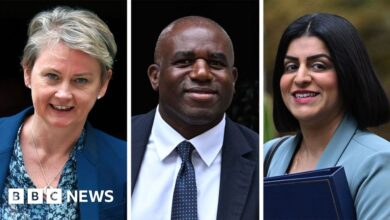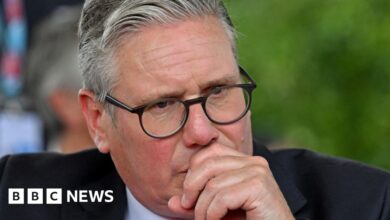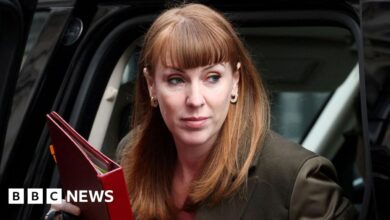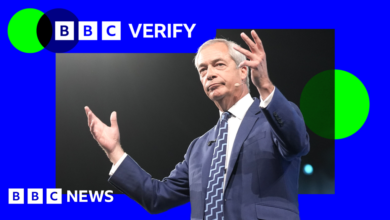Why BBC Tory leader debate is not happening, and why it matters
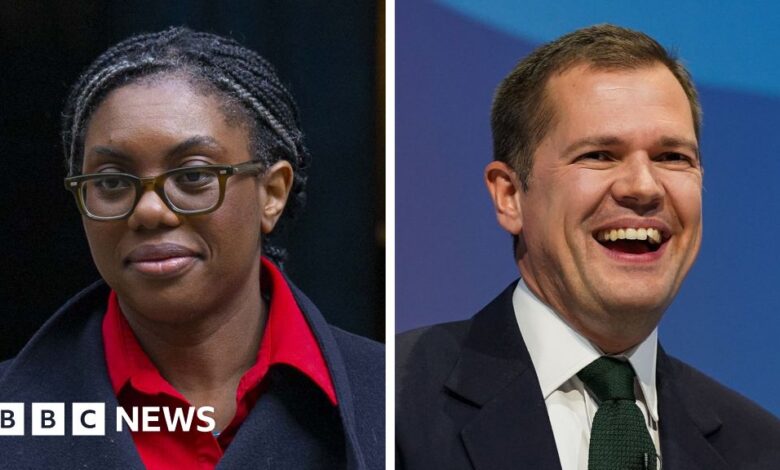
You can learn a lot about modern election campaigns by looking at the rows about TV debates.
And the current Conservative leadership race is no different.
The two candidates Kemi Badenoch and Robert Jenrick took part in a two hour special on GB News last night.
But a planned Question Time special on BBC One next week and a programme planned by The Sun are currently off, after objections from Badenoch.
More often than not, the perceived frontrunner in any contest is rather more circumspect about putting themselves on a potential collision course with calamity or embarrassment than the perceived challenger.
And, therefore, they might find reasons to turn down appointments with the cameras.
So it appears in the tussle between Badenoch and Jenrick.
As they each vie to replace Rishi Sunak to become the Leader of the Opposition, Jenrick’s holding position is to say “yes” to invites to interviews and journalistic scrutiny and Badenoch’s is to often say “no”.
To be clear, it is of course their prerogative to choose who to talk to and this is a popularity contest among tens of thousands of Conservative Party members rather than tens of millions of the wider UK electorate.
So, understandably, the focus principally, for now, is on reaching them rather than a broader audience.
The GB News programme wasn’t a debate between the two candidates directly – each appeared separately to take questions from a studio audience of Conservative Party members and viewers at home.
At the end, for what it is worth, an overwhelming majority of the audience in the room endorsed Badenoch.
The BBC wrote to both candidates inviting them to its live programme next Thursday, in which around half the studio audience would be recent Conservative voters with a “balance” of those who had a strong preference for Jenrick or Badenoch.
The other half would be people “with a variety of political sentiments and voting history, many of whom will have voted Conservative at some point in the past,” the letter set out, adding:
“We know the Conservative party leadership will be decided by party members, but the election of the Leader of HM Opposition is a moment of clear and wide public interest.”
While Jenrick, I understand, had some issues with this plan, he said yes to the invitation and was willing to attend.
Badenoch said no.
The Tories have stipulated that any official event must have a studio audience made up of people who have a vote in the contest – in other words, Conservative Party members.
The BBC has said that the audience “must be compliant with the BBC’s duties as a public service broadcaster, which are not the same as for a party event.”
The Conservative Party also wanted to charge £10 per ticket for the event.
The BBC said it could not could not charge licence fee payers to attend a BBC programme.
And so there is deadlock, an impasse.
“It is in cold storage,” said one source.
Were both candidates to accept the BBC’s invitation – or any other from another outlet – there is little the Conservative Party centrally could likely do to stop them, I’m told.
All this illustrates a wider gulf between the two camps about their campaigning approach.
It is a gulf Team Jenrick have sought to emphasise, by adopting a “any time, any place, anywhere” philosophy to requests for public debates or hustings.
They have done this knowing their opponent is less keen and in the hope they can point to this as an illustration of why Jenrick, in their view, is better suited to be Leader of the Opposition than Badenoch.
The thrust of their argument is the job is all about making your case publicly and taking questions from all comers, so prove you can do it now.
But Team Badenoch argue they don’t knowingly throw rules set down by the national party out of the window on a whim – unlike their opponents — and they are ruthlessly focused on talking to those with a vote in this election.
And, they argue, they have the most MPs, the most former MPs, the most peers and the most councillors backing their campaign.
The new leader of the Conservative Party will be announced on Saturday 2 November.

